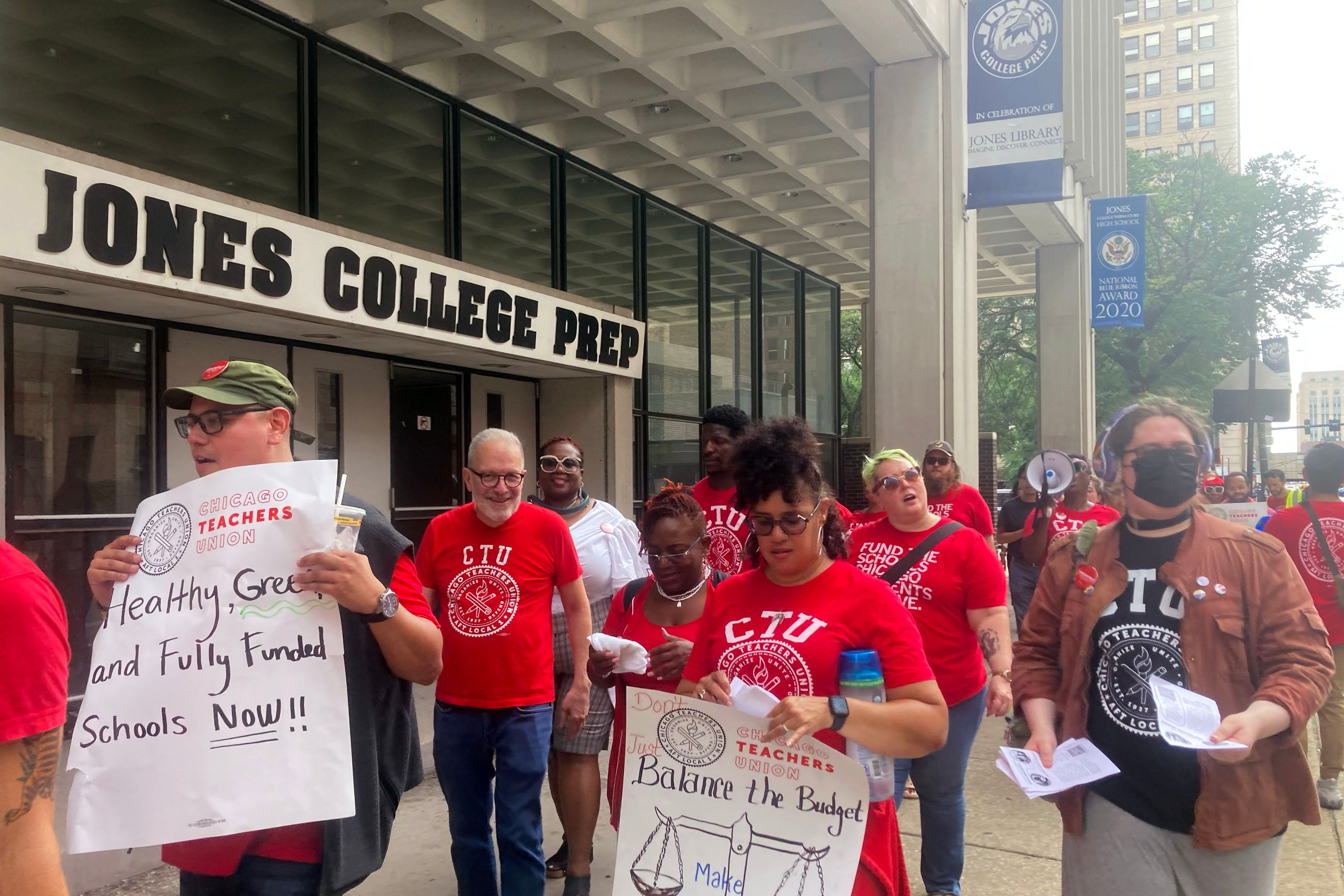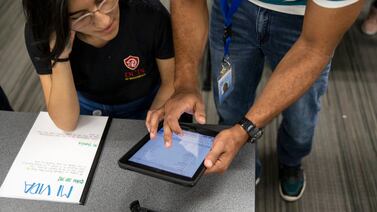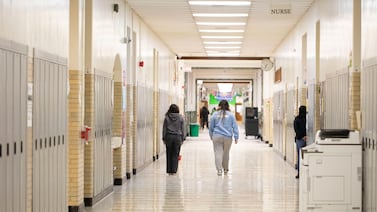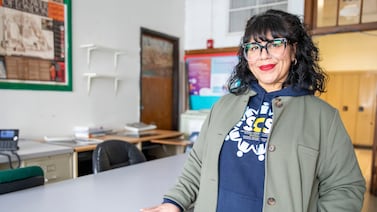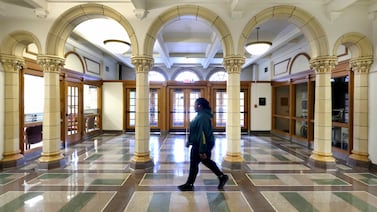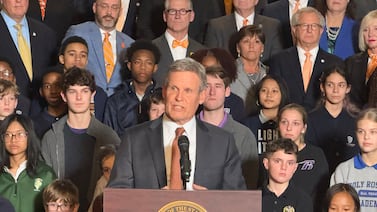Sign up for Chalkbeat Chicago’s free daily newsletter to keep up with the latest education news.
Tensions are flaring over the approval of Chicago Public Schools’ $9.9 billion budget, with a looming school board vote on it next week.
The district held public hearings on the budget proposal at Jones College Prep High School on Tuesday amid unusual uncertainty over its prospects. Mayor Brandon Johnson has said he does not support the proposal, which includes some cuts to central office staff and other expenditures to close a $505 million deficit.
Meanwhile, the Chicago Teachers Union, which helped elect Johnson last year, has lambasted the budget since it was unveiled last week, and its members packed Tuesday’s hearing to demand that the district spend more to improve schools, rather than cut back.
The mayor-appointed school board is slated to vote on the budget a month later than usual. Notably, the proposal does not factor in raises for educators. The district is negotiating new contracts with its teachers and principals unions, and officials noted that the budget would need to be revised to account for the cost of these contracts once they are settled.
An internal CPS memo Chalkbeat obtained last week shows that Johnson pressed the board to cover those costs by borrowing money through what would likely be a high interest, short-term loan. But the board and district leaders pushed back, multiple sources said. The memo, prepared by district staff, argued that taking out a short-term loan would add to the district’s already significant debt burden, potentially weaken the district’s already poor bond rating, and merely defer its fiscal problems until next year.
Earlier on Tuesday, the teachers union also held an event calling on state lawmakers and Gov. J.B. Pritzker to provide more funding for Chicago schools. That followed a spring trip to Springfield by Chicago Public Schools CEO Pedro Martinez and union leaders, who tried to make a joint case for more dollars. During that trip, they noted that though the state has markedly boosted funding for the district in recent years, CPS is still about $1 billion short of what would be considered adequate under Illinois’ own formula. But lawmakers granted only a fraction of the district’s request during the session they wrapped up in June.
At Tuesday’s hearing, Jackson Potter, the teachers union vice president, argued the district must budget more money as it steps up efforts to lobby state and federal officials for more funding, including during the Democratic National Convention in Chicago in August. He said Chicago needs to invest more in schools so it can “get away from a choice district” and reinvigorate neighborhood schools.
“We won’t accept austerity when we need expansive, bold fiduciary advocacy,” he said.
Pavlyn Jankov, another union official, suggested the district should also push for higher taxes for corporations and high earners in the city, acknowledging that raising property taxes now would be a “political flashpoint.”
Jianan Shi, the school board president, said board members are aligned with the mayor’s push for more school funding, nodding to financial pressures that the city and state also face.
“That’s not just Mayor Johnson’s north star,” he said. “It’s all of our north star.”
On Wednesday, during a meeting for the board to review its agenda for next week, neither Shi nor other board members made any comments or asked any questions about the budget. A second budget hearing is scheduled at Jones College Prep at 6 p.m. Wednesday.
At Tuesday’s hearing, more than a dozen union members addressed the board to demand that the district back union proposals for smaller class sizes, a librarian in every school, more special education support staff, updated curriculums, substitute-teacher pay increases, and other investments.
Some members decried the layoffs this spring of teaching assistants and other support staff. The district has committed to reassigning those employees to other schools or covering their salaries for the coming school year, but the union argues that the process is nevertheless disruptive for students.
Several charter leaders also addressed the board, requesting that it increase their schools’ budgets. They said that as with district-run schools, their communities are seeing an influx of English learners and other students with high needs. Overall funding for charters is up slightly, but many campuses with declining enrollment will experience steep cuts.
“Charter schools are part of the CPS portfolio and deserve to be funded equitably,” said Joanne Tanner, CEO of Civitas Education Partners, which runs the CICS charter network.
Martinez’ budget proposal includes more money for district-run campuses, extending a period of adding school staff and other spending powered by federal COVID relief dollars since the start of the pandemic. The district said a proposed $149 million increase in funding for schools is largely driven by increased services for students with disabilities, as well as modest boosts for charter schools and bilingual services.
The district is spending the final $233 million of its $2.8 billion in pandemic recovery funds this fiscal year. It is adding about 800 school-based positions — including 500 teachers — while eliminating about 40 central office and citywide support positions and freezing 200 vacant jobs in its district office.
“Despite some of our budget pressures, we are still investing in people,” the district’s chief budget officer, Michael Sitkowski, said at the Tuesday hearing. “That’s what drives our success.”
Overall, this year’s budget is slightly larger than last year’s because of an increase in capital spending, which comes after the district froze most projects and repairs last year to craft a longer-term blueprint for facility spending.
Reema Amin contributed to this report.
Mila Koumpilova is Chalkbeat Chicago’s senior reporter covering Chicago Public Schools. Contact Mila at mkoumpilova@chalkbeat.org.

